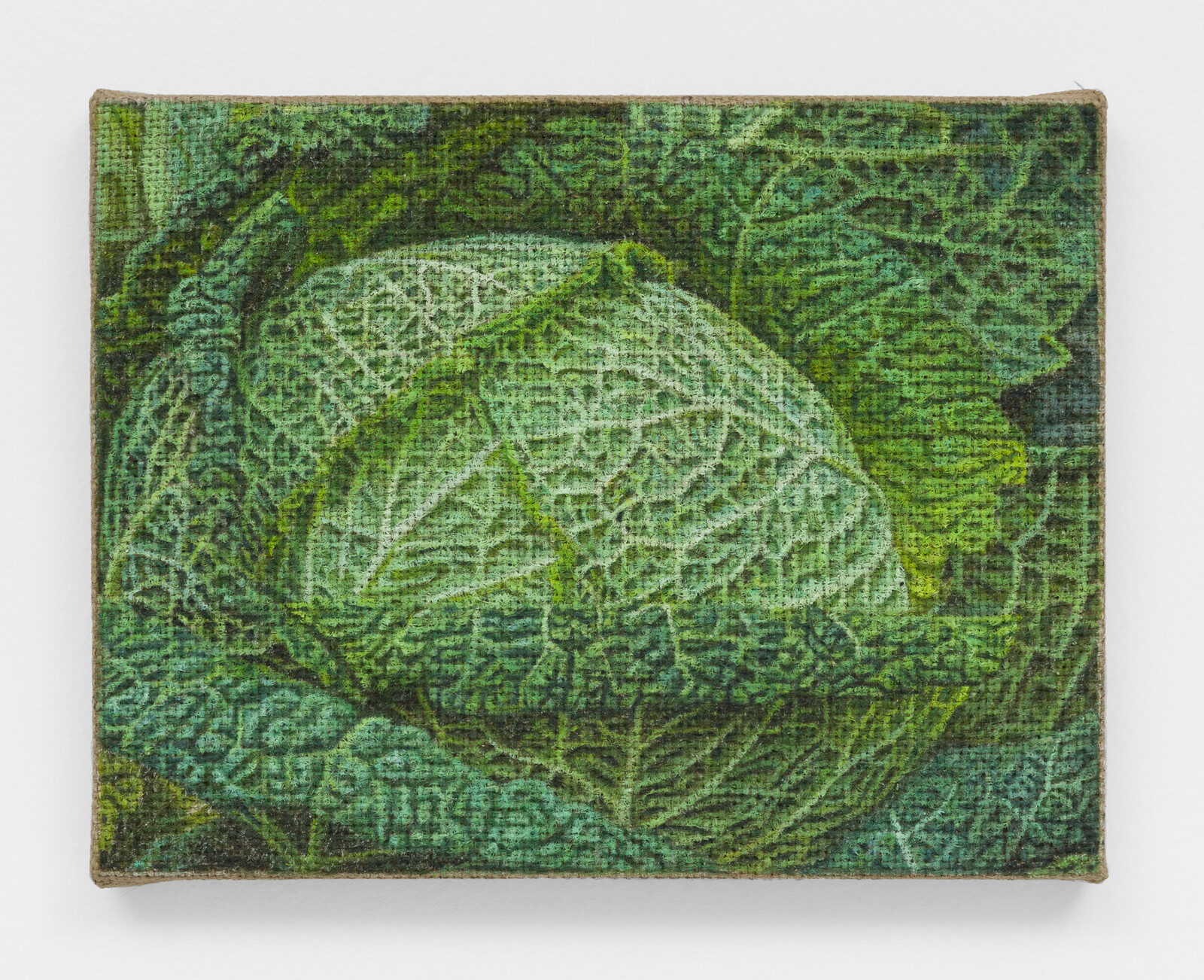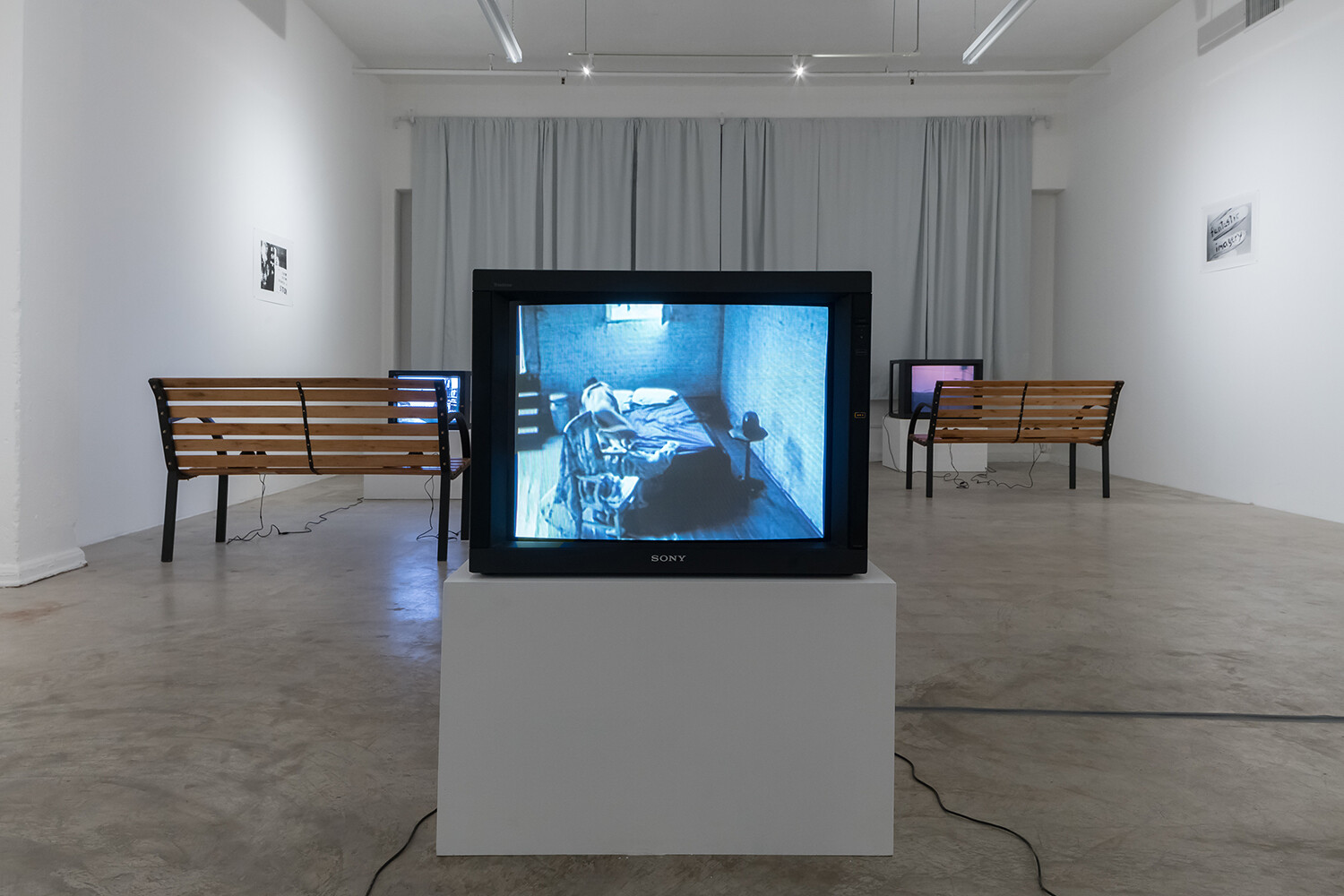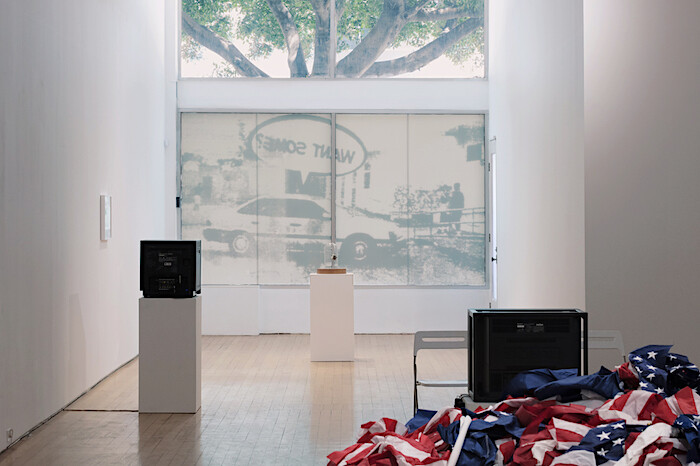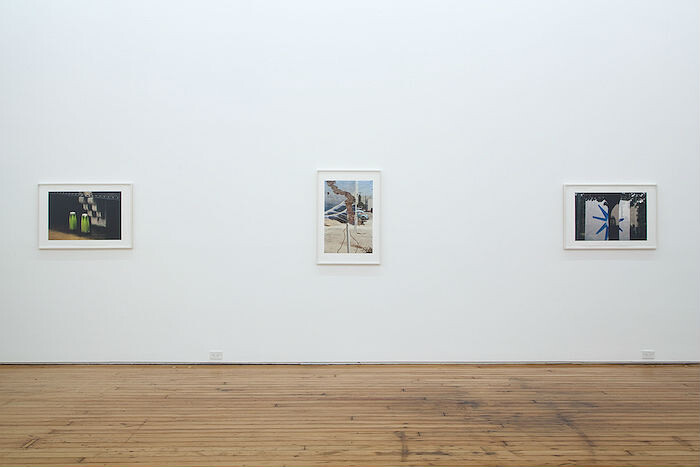Categories
Subjects
Authors
Artists
Venues
Locations
Calendar
Filter
Done
October 14, 2020 – Review
Jennifer J. Lee’s “Wallflowers”
Travis Diehl

The eleven compact paintings in Jennifer J. Lee’s “Wallflowers,” all dating from 2020, hang heavily on the white walls of Chateau Shatto, Los Angeles. Each work is around A4 in size and plays with layers of texture and detail, transferring source images of intricate scenes—stonework, crocodile skins, flowers, and seeds—onto an unforgivingly wide-woven jute. The slime-aged arches of Abbey, the blood-orange marble of Elevator, the baked psychedelia of Wallpaper—the unprimed material dims Lee’s colors as if with time.
The pictures are further compressed by their cropping. Couch depicts a sofa, patterned in garden-, bruise-, and fire-hued florals of a boomer vintage: the painting’s rough surface, pigmented and oiled, resembles the coarse upholstery of its subject. It lets slip only the tiniest patch of context—a glimpse of a room—in the upper-right corner. The composition is otherwise foreshortened, the pillowy seams of the cushions and pleats cutting a smart diagonal. In Cathedral, Lee’s rendering of tracery and arcades narrows to a blotchy impressionism, as if through a lens with a shallow depth of field. The canted planes in Wallpaper, Elevator, Records, and Security Mirror similarly place their subjects in the middle-distance.
Each image pushes to the edges of the …
May 15, 2018 – Review
Chris Kraus’s "In Order to Pass: Films from 1982–1995"
Patrick Steffen

Dear Chris,
How sweet it was talking with you at the opening of your show. You allowed me to introduce myself, so I could share some words I have longed to tell you since I arrived in this city. I was introduced to Los Angeles through your writings: a primal, unfettered education in the local art scene; I know it well enough now that my interest has begun to wane. I feel like Gravity—the main character in your film Gravity & Grace (1995), one of nine on view at Château Shatto—when a stranger rests his head between her legs and she stares into the void, seeking something meaningful, relevant, eternal. The way you edited that scene—the way you edited your entire filmography—reflects the way you write. You speak the way your characters speak.
I hear your voice throughout these films. Formally, they range from documentary—such as Voyage to Rodez (1986), in which you recount an episode in Antonin Artaud’s life, and Traveling at Night (1990), about a field trip to a deconsecrated Wesleyan Methodist Church in Darrowsville, New York—to fiction. Sadness at Leaving (1992), for example, is based on Erje Ayden’s 1987 autobiographical novel of the same name, about his time as …
July 10, 2017 – Review
"At this stage"
Travis Diehl

Where to begin? Where else but at this stage? A cotton boll embalmed in a bell jar like the Disney rose in Beauty and the Beast (1991): Aria Dean’s Dead Zone (1) (2017) gives the rose’s place to a white commodity once harvested by black people made commodities. The cotton stands there like a badly conserved museum piece that still reeks of shame. But there is a current charge, too: viewers can take their photos, but they’ll have to wait to post them. Under the bell jar’s oversized base, Dean has hidden a signal jammer modeled on the ones Beyoncé’s bodyguards use to scramble any cell phone in the star’s radius. We are at the stage where a celebrity needs military-grade technology to stage-manage their image—and meanwhile in the ongoing spree of police murdering black Americans, video evidence earns no justice, only spectacle.
Dean’s is the first piece inside gallery Chateau Shatto for this summer of 2017; this is a topical group show, and the topic is a gut check of American exceptionalism. At this stage! The phrase suggests a sequence, a disease—progression, if not progress—like the shot holding on a film of a skyscraper in Sturtevant ‘Warhol Empire State’ (1972). …
February 8, 2016 – Review
"Jean Baudrillard’s photography: Ultimate Paradox"
Jennifer Piejko

In “Ultimate Paradox,” swaths of rich, saturated color hang across each of 20 framed photographs. Rust-hued powdery tree trunks overshadow a flittering, out-of-focus leafy green background (Alentejo, 1993), an angle which would have required the photographer to climb several meters into the tree’s branches; the acid-azure knotted tree trunk shot in Vaucluse (1992) matches an overstuffed pillowcase in Paris (1985) and a taut plastic tarp ceiling installed in Rio (1996); the dripping crimsons of two lone cafe chairs planted outside in late-afternoon Luxembourg (2003) mirror the sanguine velvet regally draping an armchair in Sainte Beuve (1987); and the reflection of an orange car buoys upside-down on an inky pond camouflaged by celadon and electric chartreuse lily pads in the gorgeous Brugges (1997), whose delicate floating leaves’ green is picked up in a pair of ragged concrete posts on the shore caked with moss streaks of the same shade in Amsterdam (1992). Titled after the city in which it was taken, each giclée print, screened on pure cotton paper, is empirically visually pleasing, a tasteful selection of aspirational-lifestyle and global-traveler snaps.
Sainte Beuve also covers The Conspiracy of Art, Jean Baudrillard’s 2005 limb-from-limb dismantling of the global contemporary art system. Perhaps his …